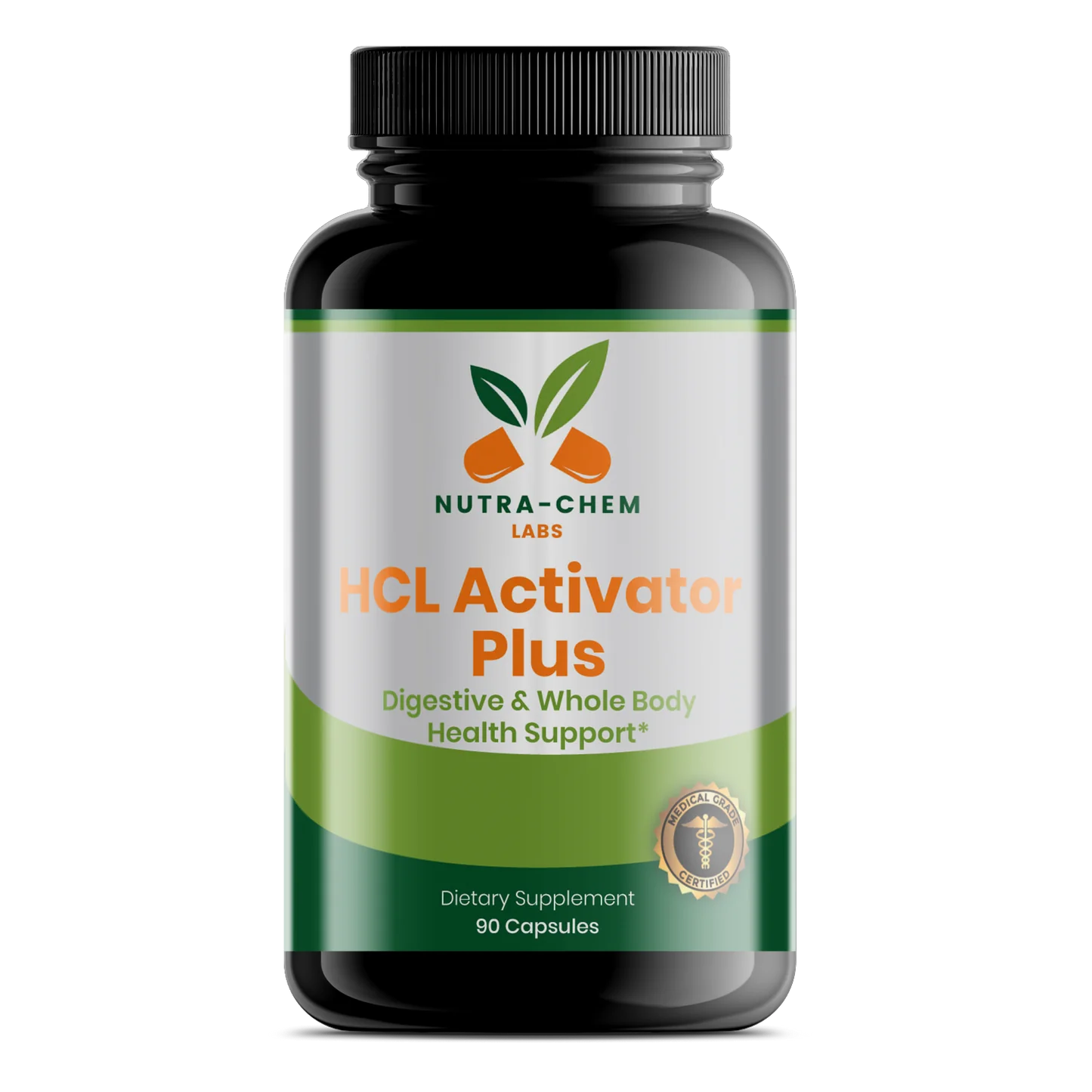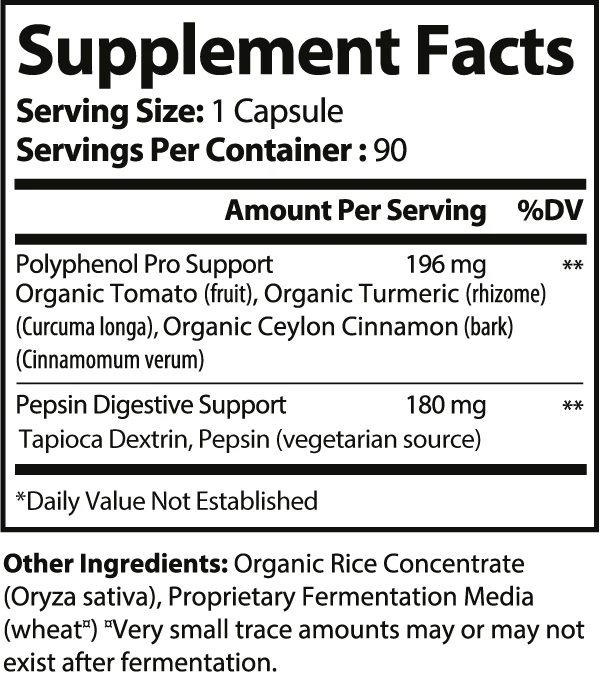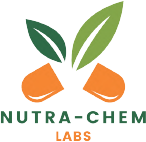- Description
- Key Ingredients & Benefits
- Usage & Directions
- Quality Standards
- Warnings
- Sources
HCL Activator Plus is formulated to support digestion, maintain optimal stomach pH, and help balance stomach acid levels, especially in aging adults. It is designed to aid in the breakdown and absorption of nutrients, countering the natural decline of stomach acid and digestive enzymes over time. Working synergistically with Betaine HCL Plus, HCL Activator Plus is ideal for those seeking enhanced digestive support.
Betaine HCL: Supports healthy digestion, protein metabolism, and balanced stomach acid levels, with added benefits of enhanced gut microbiome activity.
Organic Turmeric: Provides antioxidant and anti-inflammatory support, promoting joint, cardiovascular, and liver health, as well as blood sugar regulation.
Organic Tomato: Offers prostate and cardiovascular support, as well as antioxidant and immune-boosting benefits, helping to combat oxidative damage.
Pepsin: Aids in nutrient digestion and helps maintain healthy stomach acid levels for improved digestive efficiency.
Take 1 capsule three times daily with meals, or as directed by your healthcare practitioner. For comprehensive digestive support, consider taking 1 capsule each of HCL Activator Plus and Betaine HCL after each meal.
-High-Quality Ingredients: Uses NON-GMO verified ingredients, GMP certified, and made in an FDA-registered facility.
-Bioavailable & Effective Dosing: Includes top-quality betaine HCL and superfoods for optimal effectiveness, unlike other formulas that may rely on lower-quality sources with potential heavy metal contamination.
-*These statements have not been evaluated by the Food and Drug Administration. This product is not intended to diagnose, treat, cure, or prevent any disease. -Tamper Seal: Use only if the seal is intact. Consult your health care practitioner if you are pregnant or nursing, taking medications, or have a medical condition, before taking this or any other product. -Store in a cool, dry place. Keep out of reach of children.
117. Chilelli, N. C., Ragazzi, E., Valentini, R., Cosma, C., Ferraresso, S., Lapolla, A., & Sartore, G. (2016). Curcumin and Boswellia serrata Modulate the Glyco-Oxidative Status and Lipo-Oxidation in Master Athletes. Nutrients , 8 (11), 745. https://doi.org/10.3390/nu8110745
118. Barzegar, A., & Moosavi-Movahedi, A. A. (2011). Intracellular ROS protection efficiency and free radical-scavenging activity of curcumin. PloS one , 6 (10), e26012. https://doi.org/10.1371/journal.pone.0026012
119. Banik, U., Parasuraman, S., Adhikary, A. K., & Othman, N. H. (2017). Curcumin: the spicy modulator of breast carcinogenesis. Journal of experimental & clinical cancer research : CR , 36 (1), 98. https://doi.org/10.1186/s13046-017-0566-5
120. Suhett, L. G., de Miranda Monteiro Santos, R., Silveira, B., Leal, A., de Brito, A., de Novaes, J. F., & Lucia, C. (2021). Effects of curcumin supplementation on sport and physical exercise: a systematic review. Critical reviews in food science and nutrition , 61 (6), 946–958. https://doi.org/10.1080/10408398.2020.1749025
121. Pivari, F., Mingione, A., Brasacchio, C., & Soldati, L. (2019). Curcumin and Type 2 Diabetes Mellitus: Prevention and Treatment. Nutrients , 11 (8), 1837. https://doi.org/10.3390/nu11081837
122. Ashtary-Larky, D., Rezaei Kelishadi, M., Bagheri, R., Moosavian, S. P., Wong, A., Davoodi, S. H., Khalili, P., Dutheil, F., Suzuki, K., & Asbaghi, O. (2021). The Effects of Nano-Curcumin Supplementation on Risk Factors for Cardiovascular Disease: A GRADE-Assessed Systematic Review and Meta-Analysis of Clinical Trials. Antioxidants (Basel, Switzerland) , 10 (7), 1015. https://doi.org/10.3390/antiox10071015
123. Mata, I., Mata, S., Menezes, R., Faccioli, L. S., Bandeira, K. K., & Bosco, S. (2020). Benefits of turmeric supplementation for skin health in chronic diseases: a systematic review. Critical reviews in food science and nutrition , 1–15. Advance online publication. https://doi.org/10.1080/10408398.2020.1798353
191. Chen, P., Zhang, W., Wang, X., Zhao, K., Negi, D. S., Zhuo, L., Qi, M., Wang, X., & Zhang, X. (2015). Lycopene and Risk of Prostate Cancer: A Systematic Review and Meta-Analysis. Medicine , 94 (33), e1260. https://doi.org/10.1097/MD.0000000000001260
192. Beynon, R. A., Richmond, R. C., Santos Ferreira, D. L., Ness, A. R., May, M., Smith, G. D., Vincent, E. E., Adams, C., Ala-Korpela, M., Würtz, P., Soidinsalo, S., Metcalfe, C., Donovan, J. L., Lane, A. J., Martin, R. M., ProtecT Study Group, & PRACTICAL consortium (2019). Investigating the effects of lycopene and green tea on the metabolome of men at risk of prostate cancer: The ProDiet randomised controlled trial. International journal of cancer , 144 (8), 1918–1928. https://doi.org/10.1002/ijc.31929
193. Shanbhag V. K. (2016). Lycopene in cancer therapy. Journal of pharmacy & bioallied sciences , 8 (2), 170–171. https://doi.org/10.4103/0975-7406.171740
370. Du, J., Zhang, P., Luo, J., Shen, L., Zhang, S., Gu, H., He, J., Wang, L., Zhao, X., Gan, M., Yang, L., Niu, L., Zhao, Y., Tang, Q., Tang, G., Jiang, D., Jiang, Y., Li, M., Jiang, A., Jin, L., … Zhu, L. (2021). Dietary betaine prevents obesity through gut microbiota-drived microRNA-378a family. Gut microbes , 13 (1), 1–19. https://doi.org/10.1080/19490976.2020.1862612
371. Guilliams, T. G., & Drake, L. E. (2020). Meal-Time Supplementation with Betaine HCl for Functional Hypochlorhydria: What is the Evidence?. Integrative medicine (Encinitas, Calif.) , 19 (1), 32–36.
372. Feldman, M., Cryer, B., McArthur, K. E., Huet, B. A., & Lee, E. (1996). Effects of aging and gastritis on gastric acid and pepsin secretion in humans: a prospective study. Gastroenterology , 110 (4), 1043–1052. https://doi.org/10.1053/gast.1996.v110.pm8612992




